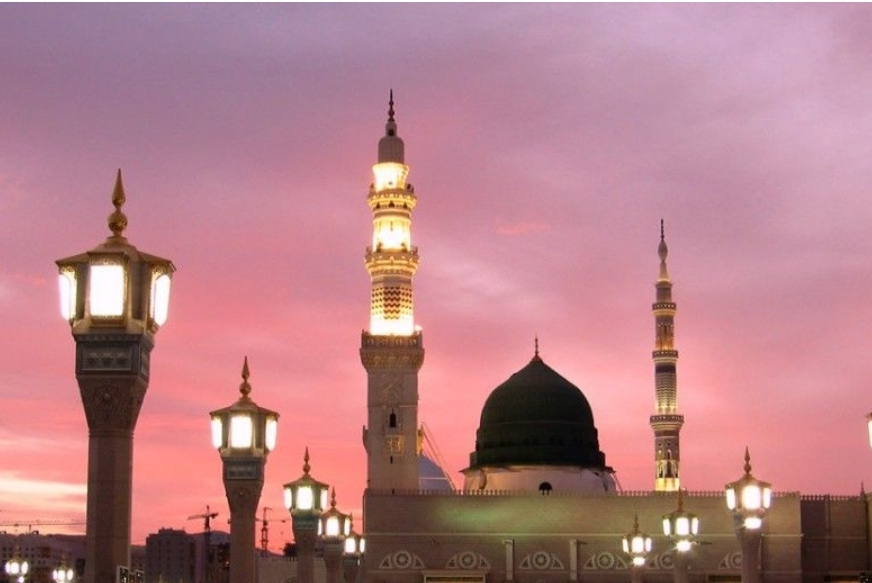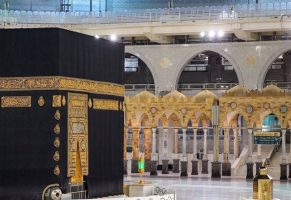
When Rasulullah (sallallahu ‘alaihi wasallam) returned from the trade journey to Syria with Maysarah, the slave of Hazrat Khadijah (radhiyallahu ‘anha), then Maysarah informed Hazrat Khadijah (radhiyallahu ‘anha) of the incidents that transpired with Rasulullah (sallallahu ‘alaihi wasallam) during the journey. He also informed her about the statement of the monk, Nastoora, regarding Rasulullah (sallallahu ‘alaihi wasallam) being the final messenger of Allah Ta‘ala, and the miraculous manner in which the angels were shading him from the sun.
When Hazrat Khadijah (radhiyallahu ‘anha) heard this, she decided to go to her cousin, Waraqah bin Nawfal, to enquire regarding the information she received about Rasulullah (sallallahu ‘alaihi wasallam). Waraqah bin Nawfal was a Christian scholar who possessed knowledge of the past scriptures – the Taurah, Injeel, etc.
On hearing the incidents, Waraqah remarked, “O Khadijah! If these incidents are true, then most certainly Muhammed will be the final messenger of this ummah. I am well aware that a Nabi will soon be sent to this ummah, and his arrival is imminent.” (Al-Bidaayah wan-Nihaayah 2/275)
After Waraqah bin Nawfal informed her that the signs of prophethood were manifest in Rasulullah (sallallahu ‘alaihi wasallam), her heart was inclined towards marrying him.
Apart from this, while Rasulullah (sallallahu ‘alaihi wasallam) was out on the journey, a strange incident occurred in Makkah Mukarramah. The women of Makkah Mukarramah gathered at a certain place for some festival, and Hazrat Khadijah (radhiyallahu ‘anha) was also present among them. During the festival, Hazrat Khadijah (radhiyallahu ‘anha) suddenly saw a Jew appear and make the following announcement before the women in a loud voice:
“O women of the Quraish! Soon there will be a Prophet in your city! His name will be Ahmed! Whoever among you is able to marry him and become his wife, she should do so!
On hearing this, all the women pelted him with stones, except Hazrat Khadijah (radhiyallahu ‘anha) who remained silent. Thereafter, when her slave, Maysarah, returned from the journey to Syria and related the incidents that took place, and also recounted the conversation with Nastoora, the monk, she said, “If what the Jew said is true, then it can be no one but him (Muhammed [sallallahu ‘alaihi wasallam] who will be appointed by Allah Ta‘ala as the final prophet).” (Sharhuz Zurqaani 1/375, 4/365)
This incident was also a cause for Hazrat Khadijah’s (radhiyallahu ‘anha) heart being inspired by Allah Ta‘ala towards marrying Rasulullah (sallallahu ‘alaihi wasallam). Hence, two months and twenty-five days after Rasulullah’s (sallallahu ‘alaihi wasallam) arrival from the trade journey, Hazrat Khadijah (radhiyallahu ‘anha) sent a proposal of marriage to Rasulullah (sallallahu ‘alaihi wasallam). After consulting his uncle, Abu Taalib, Rasulullah (sallallahu ‘alaihi wasallam) accepted this proposal. (Sharhuz Zurqaani 1/372, 375, Seeratul Mustafa 3/286)
In some narrations, it is mentioned that when Rasulullah (sallallahu ‘alaihi wasallam) returned from the journey, Hazrat Khadijah (radhiyallahu ‘anha) sent Hazrat Nafeesah bint Munyah (radhiyallahu ‘anha) to speak to him to ascertain whether he wished to get married.
Hazrat Nafeesah (radhiyallahu ‘anha) came to him and asked, “O Muhammed! Why are you not getting married?” Rasulullah (sallallahu ‘alaihi wasallam) replied, “I do not possess wealth.” She then asked him, “If this concern of yours is taken care of, and you are invited to marry a woman who possesses wealth, beauty and compatibility with you, then will you accept?” Rasulullah (sallallahu ‘alaihi wasallam) asked her, “Who is that woman you are referring to?” She replied, “I am referring to Khadijah.” (Sharhuz Zurqaani 1/374-375)
Hazrat Nafeesah (radhiyallahu ‘anha) then returned to Hazrat Khadijah (radhiyallahu ‘anha) and informed her that Rasulullah (sallallahu ‘alaihi wasallam) was interested in marrying her. Hazrat Khadijah (radhiyallahu ‘anha) then addressed Rasulullah (sallallahu ‘alaihi wasallam) and formally presented her wish to marry him.
After Rasulullah (sallallahu ‘alaihi wasallam) accepted the proposal of Hazrat Khadijah (radhiyallahu ‘anha), the date of the nikaah was fixed. Thereafter, on the decided date of the nikaah, Rasulullah (sallallahu ‘alaihi wasallam) proceeded to the home of Hazrat Khadijah (radhiyallahu ‘anha) with his uncles, Abu Taalib and Hazrat Hamzah (radhiyallahu ‘anhu), and a few other seniors of the family. (Sharuhuz Zurqaani 1/378, Seerah Halabiyyah 1/138)
The father of Hazrat Khadijah (radhiyallahu ‘anha) had passed away before the battle of Fijaar, however her uncle (father’s brother), Amr bin Asad, was present at her nikaah. (Sharhuz Zurqaani 1/378)
Abu Taalib recited the khutbah of the nikaah, and after he completed the khutbah, Waraqah bin Nawfal delivered a short speech. The final words of the khutbah of Abu Taalib were as follows:
“Muhammed (sallallahu ‘alaihi wasallam) is such that if he is compared to any other youngster from the Quraish, he will be superior to him in nobility, eminence, virtue and intelligence. If he is lacking in wealth, then wealth is just a passing shadow and a trust to ultimately be returned. He wishes to marry Khadijah bint Khuwailid and she also wishes to marry him.” (Rowdhul Unf 1/324, Sharhuz Zurqaani 1/377)
At the time of his blessed nikaah to Hazrat Khadijah (radhiyallahu ‘anha), Rasulullah (sallallahu ‘alaihi wasallam) was twenty-five years old while Hazrat Khadijah (radhiyallahu ‘anhu) was forty years old. This was the first nikaah of Rasulullah (sallallahu ‘alaihi wasallam) while it was Hazrat Khadijah’s (radhiyallahu ‘anha) third nikaah. (Sharhuz Zurqaani 1/371-374, Rowdhul Unf 1/325)
The mahr (dowry) was fixed at twenty camels. However, according to the narration of Hafiz Abu Bishr Dawlaabi (rahimahullah), the stipulated mahr (dowry) was twelve and a half ooqiyah of gold. One ooqiyah is equal to forty silver dirhams in weight. Hence, the total dowry was gold equivalent to five hundred dirhams in weight. (Sharhuz Zurqaani 1/378-379)
Some reports mention that on the occasion of the nikaah, Hazrat Khadijah (radhiyallahu ‘anha) had a cow slaughtered, and the meat was fed to the guests. After the nikaah, Rasulullah (sallallahu ‘alaihi wasallam) slaughtered a camel and fed the people the meat. This was the waleemah of Rasulullah (sallallahu ‘alaihi wasallam). (Seerah Halabiyyah 1/138-139, Sharhuz Zurqaani 1/379, Seeratul Mustafa 3/287)
Source: The Illustrious Sahaabah
 Ihyaaud Deen An Effort to Revive Deen in Totality
Ihyaaud Deen An Effort to Revive Deen in Totality



